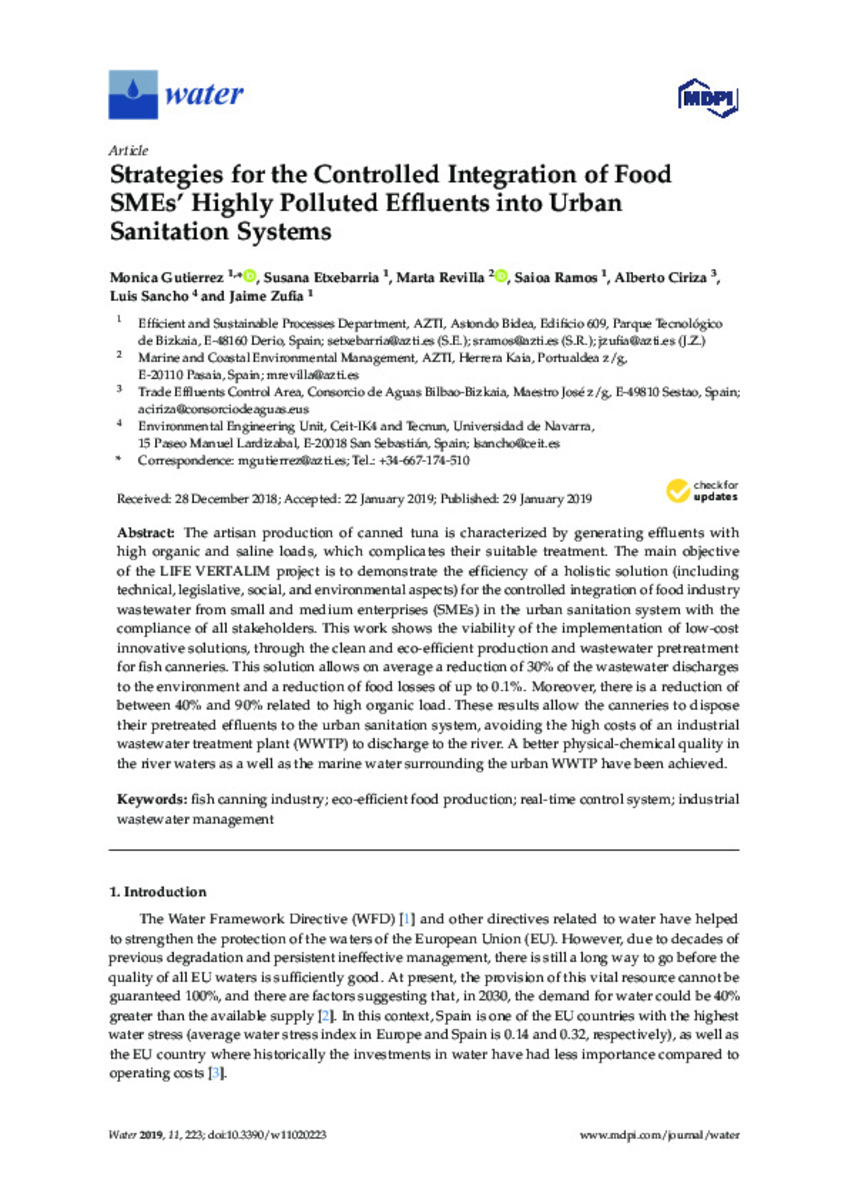Full metadata record
| DC Field | Value | Language |
|---|---|---|
| dc.creator | Gutierrez, M. (Monica) | - |
| dc.creator | Etxebarria, S. (Susana) | - |
| dc.creator | Revilla, M. (Marta) | - |
| dc.creator | Ramos, S. (Saioa) | - |
| dc.creator | Ciriza, A. (Alberto) | - |
| dc.creator | Sancho, L. (Luis) | - |
| dc.creator | Zufia, J. (Jaime) | - |
| dc.date.accessioned | 2022-01-19T07:39:02Z | - |
| dc.date.available | 2022-01-19T07:39:02Z | - |
| dc.date.issued | 2019 | - |
| dc.identifier.citation | Gutierrez, M. (Monica); Etxebarria, S. (Susana); Revilla, M. (Marta); et al. "Strategies for the controlled integration of food SMEs’ highly polluted effluents into urban sanitation systems". Water. 11 (2), 2019, 223 | es |
| dc.identifier.issn | 2073-4441 | - |
| dc.identifier.uri | https://hdl.handle.net/10171/62746 | - |
| dc.description.abstract | The artisan production of canned tuna is characterized by generating effluents with high organic and saline loads, which complicates their suitable treatment. The main objective of the LIFE VERTALIM project is to demonstrate the efficiency of a holistic solution (including technical, legislative, social, and environmental aspects) for the controlled integration of food industry wastewater from small and medium enterprises (SMEs) in the urban sanitation system with the compliance of all stakeholders. This work shows the viability of the implementation of low-cost innovative solutions, through the clean and eco-efficient production and wastewater pretreatment for fish canneries. This solution allows on average a reduction of 30% of the wastewater discharges to the environment and a reduction of food losses of up to 0.1%. Moreover, there is a reduction of between 40% and 90% related to high organic load. These results allow the canneries to dispose their pretreated effluents to the urban sanitation system, avoiding the high costs of an industrial wastewater treatment plant (WWTP) to discharge to the river. A better physical-chemical quality in the river waters as a well as the marine water surrounding the urban WWTP have been achieved. | es_ES |
| dc.description.sponsorship | This research was partially funded by European LIFE Programme (Grant number LIFE15 ENV/ES/ 000373 agreement) and by URA (The Basque Water Agency). | es_ES |
| dc.language.iso | eng | es_ES |
| dc.publisher | MDPI AG | es_ES |
| dc.rights | info:eu-repo/semantics/openAccess | es_ES |
| dc.subject | Fish canning industry | es_ES |
| dc.subject | Eco-efficient food production | es_ES |
| dc.subject | Real-time control system | es_ES |
| dc.subject | Industrial wastewater management | es_ES |
| dc.title | Strategies for the controlled integration of food SMEs’ highly polluted effluents into urban sanitation systems | es_ES |
| dc.type | info:eu-repo/semantics/article | es_ES |
| dc.description.note | Licensee MDPI, Basel, Switzerland. This article is an open access article distributed under the terms and conditions of the Creative Commons Attribution (CC BY) license (http://creativecommons.org/licenses/by/4.0/). | es_ES |
| dc.identifier.doi | 10.3390/w11020223 | - |
| dadun.citation.number | 2 | es_ES |
| dadun.citation.publicationName | Water | es_ES |
| dadun.citation.startingPage | 223 | es_ES |
| dadun.citation.volume | 11 | es_ES |
Files in This Item:
Statistics and impact
Items in Dadun are protected by copyright, with all rights reserved, unless otherwise indicated.






